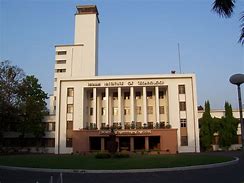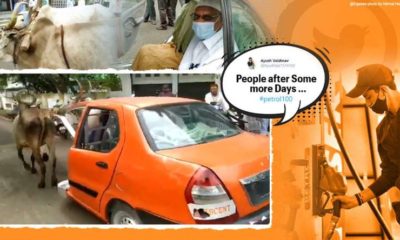Feature
India central to connecting next billion, world: Zuckerberg

New Delhi: The world cannot be connected without India, social media platform Facebook’s founder Mark Zuckerberg said on Wednesday.
“It is very important to connect people in India (one of the largest democracies) as it is central to our plans of connecting the next billion people and then the whole world,” Zuckerberg said at the townhall meeting held at the Indian Institute of Technology (IIT) Delhi.
“India is one of those countries which you cannot overlook if you want to connect the world,” he added.
The townhall at IIT Delhi follows the Menlo Park chapter at Facebook headquarters which was held during Prime Minister Narendra Modi’s second US visit.
Zuckerberg also reiterated his commitment to India by clarifying his plans of opening schools here.
“We have opened schools in Africa with internet capable infrastructure to give a boost to education quality and we are evaluating plans to open such schools in India in the future,” the chief executive said.
Asked about net neutrality and Internet.org, Zuckerberg said the platform via its free basics programme aims to solve three problems of connecting to the internet — availability, affordability and awareness.
“We are trying to aid availability by streaming the internet via satellites. In terms of affordability, free basics is free to use and also low on data consumption. Users are not forced to pay for the service,” Zuckerberg said reiterating the need of an open internet platform like its proprietary initiative Internet.org in India while reminding that Facebook always supported net neutrality and adhered to regulations.
“We have always adhered to net neutrality regulations but there are several countries who still do not have norms in place. We will adapt to them as soon as they are in place as we are in the favour of being 100 percent net neutral,” Zuckerberg said.
Further explaining, he said “Free basics programme under the Internet.org initiative aims to connect the next billion people. It does not intend to harm anyone — neither the consumers nor the operators,” he said.
“Any developer who can stream low-data consuming content can be a part of the platform,” the chief executive told a gathering of 1,100 people expressing his discontent in some way over the ongoing debate about net neutrality.
“Internet.org is currently live in 24 countries and has 50 million subscribers. India itself has nearly over one million people subscribed to the platform,” Zuckerberg said reiterating his favourite example of quoting a research that claims that every 10 people connected to the internet lifts one life out of poverty.
Currently, India has no regulations on net neutrality. Communications and Information Technology Minister Ravi Shankar Prasad in a reply to the Lok Sabha had said “the committee of the department of telecommunications on net neutrality has submitted its report. However, it is not the final report nor the government has taken any final view.”
“Based on the report, comments, suggestions and recommendations of TRAI, the government will take a considered decision on various aspects of net neutrality, in the best interest of the country,” Prasad said.
The chief executive, who is a role model for many techies, when asked about the entrepreneurs in India said that Facebook was doing its best to provide low cost tools to entrepreneurs here.
In addition, Zuckerberg also gave a sneak peak of how the future Facebook should look like by divulging several new fundamental features that the company was working on including a fix for users getting ‘irritating’ Candy Crush requests.
“We are working on making communication more effective and better which is why we have tied up with Occulus Rift to research on augmented or virtual reality,” Zuckerberg said at the townhall meeting arranged at Indian Institute of Technology (IIT), New Delhi.
“People will be able to share life-like moments with friends and family through Facebook and Whatsapp. Moments that friends and family cannot be a part of. Imagine if you could put on a headset and travel to places unthinkable,” the chief executive said adding that the virtual reality technology company (Occulus’s) headset could let users enjoy a game of ping pong underwater.
Zuckerberg also hinted at improving Facebook for physically-challenged people. “We are working on artificial intelligence in order to improve computer systems to better understand humans.”
“In the next five to ten years, Facebook might be able to read timelines, picture messages and picture captions for the physically-challenged users,” the founder said.
“This will also help Facebook connect more people boosting the network. We are also working on geo-location strategies to identify which users are in which area and in case of a calamity whether they would be likely affected or not,” Zuckerberg said giving the example of the social media platform’s success with the ‘safe’ notification during the Nepal and the Afghanistan quake that sent tremors through Delhi.
Zuckerberg also said that he was working on a project named Amber to help locate missing persons.
“Although the programme is currently running in the US and Canada, we intend to get it running in every country soon. It is a serious responsibility as we are the platform that connects millions of people together,” Zuckerberg said.
Entertainment
Meghalaya Reserves Legalized Gambling and Sports Betting for Tourists

The State Scores Extra High on Gaming-Friendly Industry Index
Meghalaya scored 92.85 out of 100 possible points in a Gaming Industry Index and proved to be India’s most gaming-friendly state following its recent profound legislation changes over the field allowing land-based and online gaming, including games of chance, under a licensing regime.
The index by the UK India Business Council (UKIBC) uses a scale of 0 to 100 to measure the level of legalisation on gambling and betting achieved by a state based on the scores over a set of seven different games – lottery, horse racing, betting on sports, poker, rummy, casino and fantasy sports
Starting from February last year, Meghalaya became the third state in India’s northeast to legalise gambling and betting after Sikkim and Nagaland. After consultations with the UKIBC, the state proceeded with the adoption of the Meghalaya Regulation of Gaming Act, 2021 and the nullification of the Meghalaya Prevention of Gambling Act, 1970. Subsequently in December, the Meghalaya Regulation of Gaming Rules, 2021 were notified and came into force.
All for the Tourists
The move to legalise and license various forms of offline and online betting and gambling in Meghalaya is aimed at boosting tourism and creating jobs, and altogether raising taxation revenues for the northeastern state. At the same time, the opportunities to bet and gamble legally will be reserved only for tourists and visitors.
“We came out with a Gaming Act and subsequently framed the Regulation of Gaming Rules, 2021. The government will accordingly issue licenses to operate games of skill and chance, both online and offline,” said James P. K. Sangma, Meghalaya State Law and Taxation Minister speaking in the capital city of Shillong. “But the legalized gambling and gaming will only be for tourists and not residents of Meghalaya,” he continued.
To be allowed to play, tourists and people visiting the state for work or business purposes will have to prove their non-resident status by presenting appropriate documents, in a process similar to a bank KYC (Know Your Customer) procedure.
Meghalaya Reaches Out to a Vast Market
With 140 millions of people in India estimated to bet regularly on sports, and a total of 370 million desi bettors around prominent sporting events, as per data from one of the latest reports by Esse N Videri, Meghalaya is set to reach out and take a piece of a vast market.
Estimates on the financial value of India’s sports betting market, combined across all types of offline channels and online sports and cricket predictions and betting platforms, speak about amounts between $130 and $150 billion (roughly between ₹9.7 and ₹11.5 lakh crore).
Andhra Pradesh, Telangana and Delhi are shown to deliver the highest number of bettors and Meghalaya can count on substantial tourists flow from their betting circles. The sports betting communities of Karnataka, Maharashtra, Uttar Pradesh and Haryana are also not to be underestimated.
Among the sports, cricket is most popular, registering 68 percent of the total bet count analyzed by Esse N Videri. Football takes second position with 11 percent of the bets, followed by betting on FIFA at 7 percent and on eCricket at 5 percent. The last position in the Top 5 of popular sports for betting in India is taken by tennis with 3 percent of the bet count.
Local Citizens will Still have Their Teer Betting
Meghalaya residents will still be permitted to participate in teer betting over arrow-shooting results. Teer is a traditional method of gambling, somewhat similar to a lottery draw, and held under the rules of the Meghalaya Regulation of the Game of Arrow Shooting and the Sale of Teer Tickets Act, 2018.
Teer includes bettors wagering on the number of arrows that reach the target which is placed about 50 meters away from a team of 20 archers positioned in a semicircle.
The archers shoot volleys of arrows at the target for ten minutes, and players place their bets choosing a number between 0 and 99 trying to guess the last two digits of the number of arrows that successfully pierce the target.
If, for example, the number of hits is 256, anyone who has bet on 56 wins an amount eight times bigger than their wager.























